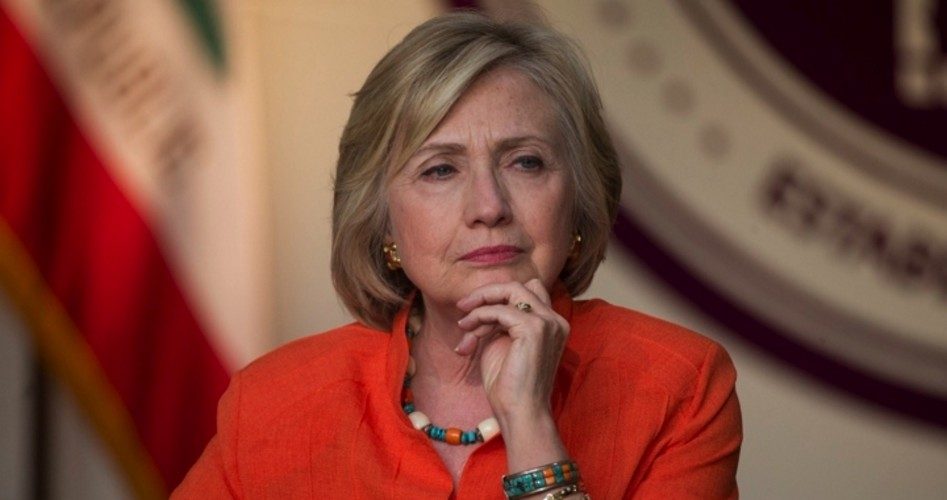
As of last week, Hillary Clinton’s e-mail server is safely in the hands of the Department of Justice. As Secretary of State, she used a private server to handle her e-mails rather than using the servers owned and operated by the federal government. Her use of private e-mail has come under scrutiny because she appears to have sent and received e-mails concerning matters marked “Top Secret.” If she sent or received those e-mails on her private account — over her private server — she most likely violated federal law.
The investigation is being handled by the FBI and is considered a criminal investigation, according to sources in the Department of Justice. In fact, though such cases are customarily handled by one of the many field offices around the country, the Clinton case is being handled out of the Hoover Building. It is highly unusual for a case like this to handled at FBI headquarters, but then again, this is an unusual case. The New York Times reported, “given this inquiry’s importance, senior F.B.I. officials have opted to keep it closely held in Washington in the agency’s counterintelligence section, which investigates how national security secrets are handled.”
While it was not illegal for her to use a private e-mail server (it was, in fact, allowed by the State Department), the question is whether she followed the proper standards for securing and storing the classified data on that server. Sending “Top Secret” e-mails would almost certainly violate those standards. Clinton has denied that she sent or received such e-mails, but the evidence seems to indicate that on at least two occasions, she did just that.
Before turning over the server, Clinton turned over a USB thumb drive containing samples of the e-mails stored on the server. Charles McCullough, inspector general for the intelligence community, told Congress last week that of the 30,000 e-mails on the USB drive, 40 of them were randomly selected for the purposes of seeing whether they contained sensitive information. Of those 40, two contained information classified as “Top Secret/Sensitive Compartmented Information.” Doing the math, McCullough estimates there could be hundreds of e-mails on Clinton’s server that were “Top Secret.”
Clinton initially refused to turn over the e-mail server, saying, “The server contains personal communications from my husband and me and I believe I have met all of my responsibilities and the server will remain private.” It rings with echoes of “I’m not going to have some reporters pawing through our papers. We are the president.” She has since reversed herself and turned over the server, but it may not help her dodge the legal problems she will face if it is determined that she handled state secrets in any way that was “prejudicial to the safety or interest of the United States.” Even if she escapes legal trouble, this scandal is likely to cause her serious problems with her campaign for the Democratic presidential nomination. The case is likely to last longer than her attempt to reoccupy the White House.
Charles Lipson, a professor of international politics at the University of Chicago, wrote in his piece for RealClearPolitics that there are several “legal questions with huge political ramifications” that Hillary Clinton will have to answer. He added that her problems “could well be insurmountable politically.” Among those questions are:
• Did the Clinton server meet the federal government’s standards for how servers are built, how they are secured, and how data is retained?
• Was all sensitive material encrypted or did it circulate without those protections?
• Did anybody hack into the server?
• Did Secretary Clinton, who says she erased all ‘personal’ e-mails from the server, actually erase some government documents?
• If so, was that inadvertent or a possible cover-up?
• Who handled IT security for this server? Could he read the materials if he wished?
These are all very good questions that need to be investigated thoroughly. This writer believes the questions for voters who might have considered reliving the Clinton era are:
• Can we trust this woman?
• Is she dishonest or just lacking in sound judgment?
• Should someone who is either so shady or so inept serve as president?
• Do we really want four or eight more years of Clinton drama in the White House?
For her part, the former First Lady chalks it all up to an error in judgment. Hindsight is, after all, 20/20. Back in March, when pressure began to mount over her use (or misuse) of the private e-mail server, Clinton said, “Looking back, it would have been better if I’d simply used a second email account and carried a second phone, but at the time, this didn’t seem like an issue.” It sure seems like an issue now. It could land her in jail, and many feel that it will almost certainly keep her out of the White House.
Photo: AP Images




